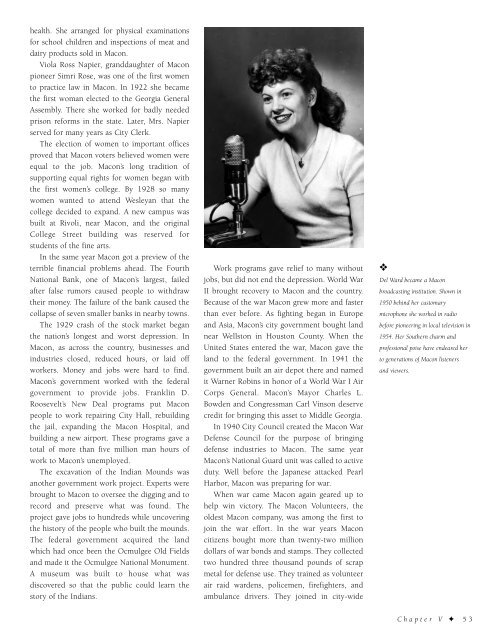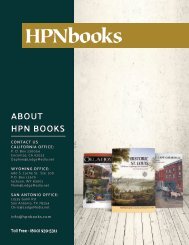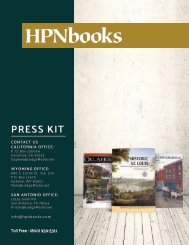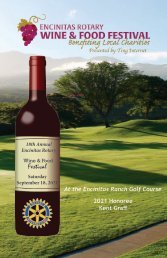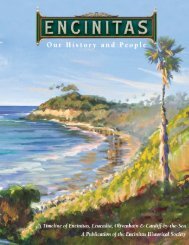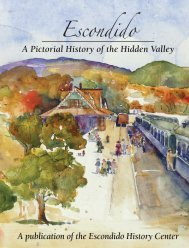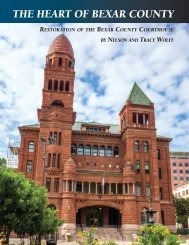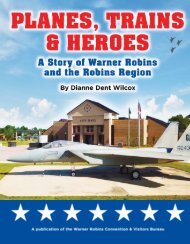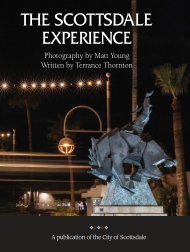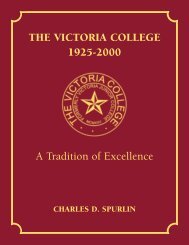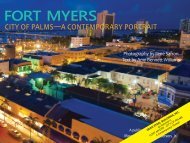Historic Macon
An illustrated history of the city of Macon, paired with the histories of companies, families and organizations that make the region great.
An illustrated history of the city of Macon, paired with the histories of companies, families and organizations that make the region great.
You also want an ePaper? Increase the reach of your titles
YUMPU automatically turns print PDFs into web optimized ePapers that Google loves.
health. She arranged for physical examinations<br />
for school children and inspections of meat and<br />
dairy products sold in <strong>Macon</strong>.<br />
Viola Ross Napier, granddaughter of <strong>Macon</strong><br />
pioneer Simri Rose, was one of the first women<br />
to practice law in <strong>Macon</strong>. In 1922 she became<br />
the first woman elected to the Georgia General<br />
Assembly. There she worked for badly needed<br />
prison reforms in the state. Later, Mrs. Napier<br />
served for many years as City Clerk.<br />
The election of women to important offices<br />
proved that <strong>Macon</strong> voters believed women were<br />
equal to the job. <strong>Macon</strong>’s long tradition of<br />
supporting equal rights for women began with<br />
the first women’s college. By 1928 so many<br />
women wanted to attend Wesleyan that the<br />
college decided to expand. A new campus was<br />
built at Rivoli, near <strong>Macon</strong>, and the original<br />
College Street building was reserved for<br />
students of the fine arts.<br />
In the same year <strong>Macon</strong> got a preview of the<br />
terrible financial problems ahead. The Fourth<br />
National Bank, one of <strong>Macon</strong>’s largest, failed<br />
after false rumors caused people to withdraw<br />
their money. The failure of the bank caused the<br />
collapse of seven smaller banks in nearby towns.<br />
The 1929 crash of the stock market began<br />
the nation’s longest and worst depression. In<br />
<strong>Macon</strong>, as across the country, businesses and<br />
industries closed, reduced hours, or laid off<br />
workers. Money and jobs were hard to find.<br />
<strong>Macon</strong>’s government worked with the federal<br />
government to provide jobs. Franklin D.<br />
Roosevelt’s New Deal programs put <strong>Macon</strong><br />
people to work repairing City Hall, rebuilding<br />
the jail, expanding the <strong>Macon</strong> Hospital, and<br />
building a new airport. These programs gave a<br />
total of more than five million man hours of<br />
work to <strong>Macon</strong>’s unemployed.<br />
The excavation of the Indian Mounds was<br />
another government work project. Experts were<br />
brought to <strong>Macon</strong> to oversee the digging and to<br />
record and preserve what was found. The<br />
project gave jobs to hundreds while uncovering<br />
the history of the people who built the mounds.<br />
The federal government acquired the land<br />
which had once been the Ocmulgee Old Fields<br />
and made it the Ocmulgee National Monument.<br />
A museum was built to house what was<br />
discovered so that the public could learn the<br />
story of the Indians.<br />
Work programs gave relief to many without<br />
jobs, but did not end the depression. World War<br />
II brought recovery to <strong>Macon</strong> and the country.<br />
Because of the war <strong>Macon</strong> grew more and faster<br />
than ever before. As fighting began in Europe<br />
and Asia, <strong>Macon</strong>’s city government bought land<br />
near Wellston in Houston County. When the<br />
United States entered the war, <strong>Macon</strong> gave the<br />
land to the federal government. In 1941 the<br />
government built an air depot there and named<br />
it Warner Robins in honor of a World War I Air<br />
Corps General. <strong>Macon</strong>’s Mayor Charles L.<br />
Bowden and Congressman Carl Vinson deserve<br />
credit for bringing this asset to Middle Georgia.<br />
In 1940 City Council created the <strong>Macon</strong> War<br />
Defense Council for the purpose of bringing<br />
defense industries to <strong>Macon</strong>. The same year<br />
<strong>Macon</strong>’s National Guard unit was called to active<br />
duty. Well before the Japanese attacked Pearl<br />
Harbor, <strong>Macon</strong> was preparing for war.<br />
When war came <strong>Macon</strong> again geared up to<br />
help win victory. The <strong>Macon</strong> Volunteers, the<br />
oldest <strong>Macon</strong> company, was among the first to<br />
join the war effort. In the war years <strong>Macon</strong><br />
citizens bought more than twenty-two million<br />
dollars of war bonds and stamps. They collected<br />
two hundred three thousand pounds of scrap<br />
metal for defense use. They trained as volunteer<br />
air raid wardens, policemen, firefighters, and<br />
ambulance drivers. They joined in city-wide<br />
❖<br />
Del Ward became a <strong>Macon</strong><br />
broadcasting institution. Shown in<br />
1950 behind her customary<br />
microphone she worked in radio<br />
before pioneering in local television in<br />
1954. Her Southern charm and<br />
professional poise have endeared her<br />
to generations of <strong>Macon</strong> listeners<br />
and viewers.<br />
Chapter V ✦ 53


